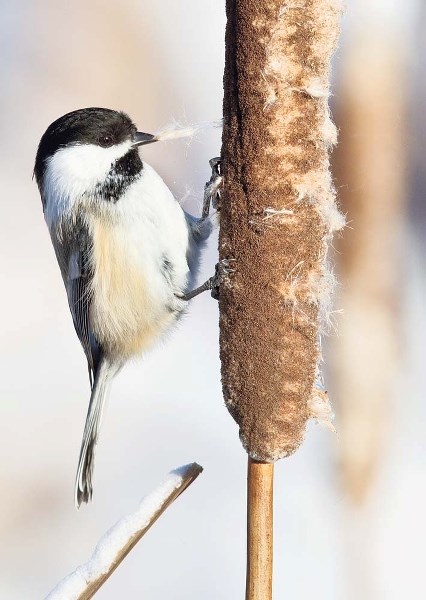Climate change is pushing two species of chickadee further north towards Canada, suggests a new study.
Scott Taylor of the Cornell Lab of Ornithology published a study in this week’s Current Biology on how warming weather is affecting the distribution of Carolina and black-capped chickadees.
Currently restricted to the southeast of the U.S., Carolina chickadees look almost identical to Canada’s black-capped ones. A black-capped chickadee’s call will consist of two different notes (“FII-bee”), however, while a Carolina’s call will have four (“fii-bee-CEE-deee”).
These two species can interbreed, but the hybrids tend to get outcompeted by the purebreds, Taylor says. As a result, you can usually only find hybrids in a distinct, narrow zone that shows where the ranges of the Carolina and the black-capped chickadees meet.
Taylor and his team used bird observations from eBird (an open-source database that tracks bird sightings) and blood samples from some 167 chickadees at specific sites in Pennsylvania to see if this hybrid zone moved between 2000 and 2012.
“We found it moved north by about 11 kilometres in the past decade,” he said. Test sites that were in the middle of the hybrid zone at the start of the study were almost completely dominated by Carolina chickadees by the end, and sites north of those that started as mostly black-capped ended up as mostly hybrid.
When the team overlaid temperature data with field observations from eBird, it found that the northern edge of the Carolina chickadee’s territory (i.e. the hybrid zone) corresponded to the point where mean winter temperatures were below -7 C – likely due to the fact that Carolina chickadees are less cold-resistant than black-capped ones.
That temperature zone had moved about 11 kilometres north in the last decade due to climate change – the same amount of movement seen in the hybrid zone. Taylor’s team concluded that the bird movements were linked to the temperature change.
Birds are relatively mobile and have been able to keep up with climate change, Taylor said. Bugs, amphibians, small animals and other creatures are not.
“There’s a potential they will not be able to match the rate of climate change,” he said, putting their survival at risk.
A local naturalist hopes bug watchers will get online this year to help scientists track trends in butterfly populations.
John “the Nature Nut” Acorn, a renewable resources instructor at the University of Alberta, is giving a free talk to the Edmonton Nature Club later this month on Edmonton-area butterflies.
It might seem a bit early to be talking about them, but in most years you can see one or two butterflies flapping about in Edmonton as early as February, Acorn said. (That didn’t happen this year since it was so cold.)
Acorn hoped to encourage people at the talk to log their butterfly observations into eButterfly – a crowd-sourced database similar to eBird.
“Right now, we’re still building it,” he said, but it’s filling up with observations fast. Once it has enough records, researchers will be able to use it to track trends in butterfly populations and movements, such as the recent move of northern pearly eyes into Alberta from Saskatchewan.
Acorn said the first butterflies to emerge this year would likely be the mourning cloaks, which overwinter here and could pop out any day now. Cabbage whites and the spring azures should emerge from their pupae around April.
“Once those things pop out, there’s no stopping it – spring’s definitely arrived.”
Acorn’s talk is this March 21 from 7:30 to 9 p.m. at the King’s University College. Admission is by donation. Visit edmontonnatureclub.org for details.




